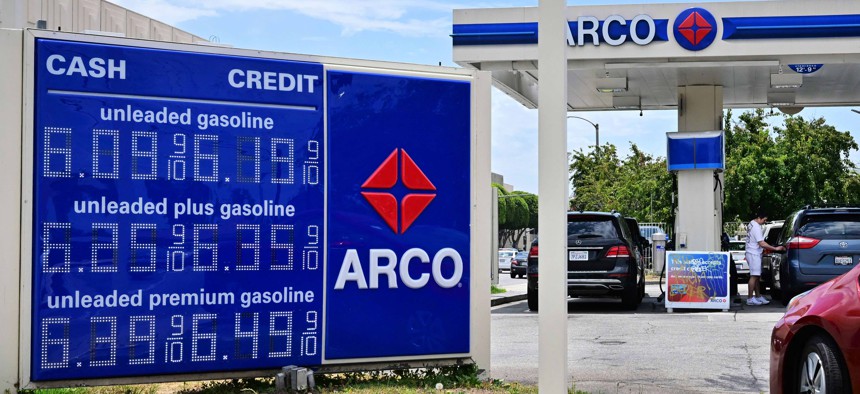Instead of Relief at the Pump, California Moves to Put Cash in Pockets

Gas prices are listed at over $6 per gallon in Los Angeles, California on June 22. Frederic J. Brown/AFP via Getty Images
State leaders are opting for direct payments up to $1,050, rather than a gas tax suspension as they look to provide residents a break from skyrocketing prices.
The Democratic officials who control California state government have reached a budget deal that will funnel direct payments of around $1,000 in some cases to cash-strapped voters squeezed by high prices for gasoline and other basics.
The crux of the deal is a $17 billion component to help residents cope with inflation, including higher gas prices, which now average more than $6 a gallon in California. But the bulk of that relief under the new plan would come through income tax rebates rather than gas tax suspensions.
Depending on their income, Californians could receive up to $1,050, with bigger checks going to lower-income residents. Roughly 23 million of the 39 million people in the state will qualify. Other components of the deal would help people pay rent and utility bills.
President Biden just last week asked Congress and the states to pass gas tax relief. The California agreement is notable in that it takes a more general approach giving a break to taxpayers with the rebates, rather than directing relief to drivers by slashing taxes at the pump.
The part of the package that deals most explicitly with high fuel prices is the suspension of a portion of the state’s sales tax on diesel. Because of climbing fuel prices, the sales tax on diesel was expected to jump from 27 cents a gallon to 47 cents a gallon in July.
The 12-month suspension of the sales tax will start in October. It will cost the state $439 million to replace that money, which would otherwise go to public transit projects. Legislative analysts said the suspension of the sales tax on diesel would mostly help businesses, which own more diesel vehicles than the general public.
Fuel taxes, which are not directly affected by the price of gasoline or diesel, will increase by 3 cents a gallon at the beginning of next month, as previously planned. The new rates will be 53.9 cents per gallon for gasoline and 41 cents per gallon for diesel.
“California’s budget addresses the state’s most pressing needs and prioritizes getting dollars back into the pockets of millions of Californians who are grappling with global inflation and rising prices of everything from gas to groceries,” California Gov. Gavin Newsom said in a joint statement with the leaders of the state Assembly and Senate.
Senate President Pro Tem Toni Atkins said that, under the budget plan, “we are spreading our state’s wealth to hard-working Californians and small businesses like never before.”
But the approach is markedly different from one that Newsom put forward during his state of the state speech in March. The governor wanted to help offset the rising price of gasoline by sending $400 gift cards to vehicle owners, with a maximum of two cards per person.
Newsom’s fellow Democrats in the legislature resisted, because of concerns that the proposal would undermine California’s efforts to reduce carbon dioxide pollution and that it would disproportionately benefit wealthier residents. The California Budget & Policy Center, a left-leaning think tank, for example, noted that Californians without cars were more than twice as likely to struggle to meet basic needs compared to residents with vehicles.
In encouraging more states to suspend their fuel taxes to help consumers, Biden last week noted that states are on solid financial footing, thanks in part to direct aid from the federal government and other federal spending that propped up the national economy during the Covid-19 pandemic.
Many Republicans are now blaming that federal spending for driving inflation and say Biden’s energy policies are what’s forced up gas prices. The president and Democrats have pushed back on both these points, but are also looking for ways to tamp down fuel costs and provide other inflation relief as the November elections approach.
A handful of states, led by governors from both parties, have already enacted gas tax suspensions, which are politically popular even if consumers see little benefit. But many governors and lawmakers have resisted the idea, especially because fuel taxes are usually devoted to transportation projects, and states need money to pay for their local share of projects authorized under Biden’s new infrastructure law.
Daniel C. Vock is a senior reporter for Route Fifty based in Washington, D.C.
NEXT STORY: How One State Used Its Giant Budget Surplus






